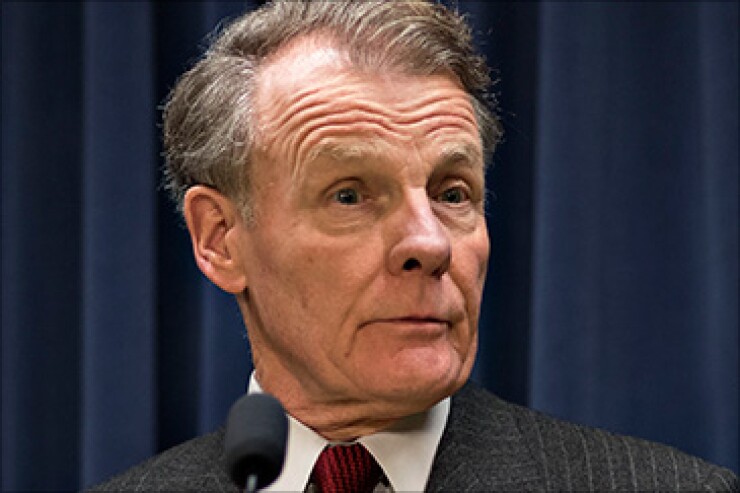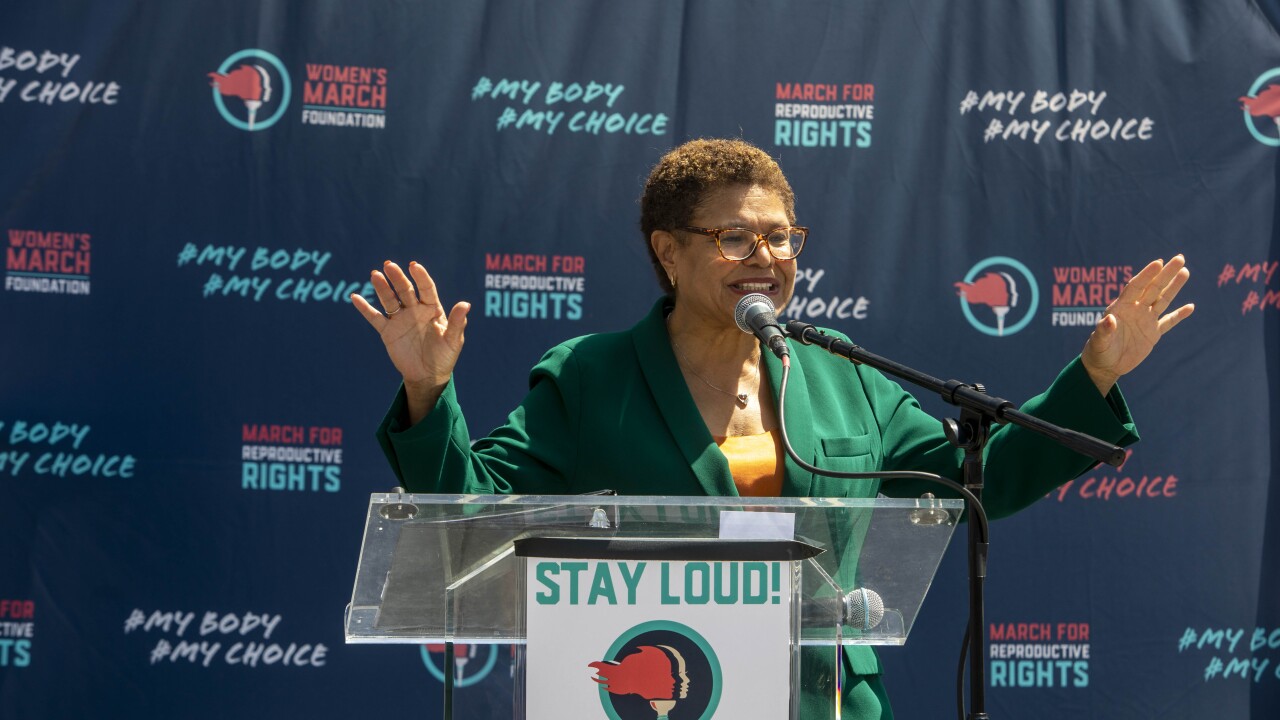
CHICAGO – Illinois opened its new legislative session Wednesday with a renewed warning from Fitch Ratings that the clock is ticking on a possible downgrade if lawmakers and Gov. Bruce Rauner can't break their budget stalemate.
Fitch rates Illinois general obligation bonds BBB-plus, and placed the credit on rating watch negative in June.
"Fitch has previously indicated that the Rating Watch would be resolved by the end of January. The expected timing of Fitch's review is unchanged," Fitch's lead Illinois analyst Karen Krop wrote in a special commentary released Wednesday. "Fitch has stated that failure to enact measures that lead to ongoing budget balance would trigger a downgrade."
General Assembly members elected in November were sworn in and members elected the same team of majority and minority leaders including House Speaker Michael Madigan, D-Chicago, who was a prime target of first term Gov. Bruce Rauner's budget attacks.
Both the House and Senate took steps took some immediate legislative actions, some of which could lead to a budget fix, and the tone out of Springfield at least for the day softened with talk of ending the bickering that has left the state without a full, enacted budget for more than 18 months.
Whether the spirit of compromise will last remains to be seen. The House and Senate also remain on divergent paths.
The Republican governor's demand that Democrats include pieces of his economic and political turnaround agenda as part of a budget agreement that raises taxes and the Democrats' resistance to do so have driven stalemate that's dragged its rating down to the lowest among states.
Fitch made clear last fall that state action that begins to tackle its fiscal woes was needed by the end of January or the state risks another downgrade. Rauner and leaders had previously agreed on a stopgap spending plan to see the state through 2016 in hopes of resolving their differences after the November election and acting during by lame-duck session earlier this week.
A bipartisan "Grand Bargain" package from Senate leaders was pitched but stalled and the lame duck session ended in a thud Tuesday. A package of 13 bills that are part of the "Grand Bargain" were introduced Wednesday.
Senate President John Cullerton, D-Chicago, and Minority Leader Christine Radogno, R-Lemont, said earlier this week they are aiming to pass the package by Feb. 1. Rauner has praised the Senate's efforts at compromise but the legislation's fate in the House is uncertain.
The bills would authorize spending for the remainder of fiscal 2017 that ends June 30, raise the income tax, expand gambling, authorize $7 billion in short-term borrowing to pay down the state government's $11 backlog of unpaid bills , and reform parts of the state's pension system. The package also includes versions of several of Rauner's agenda items.
"After two years, there are indications that Illinois may begin to address the issues that have led to an extended budget stalemate, credit deterioration" and negative watch, Fitch wrote about the Senate proposal.
The proposals potentially could stabilize Illinois' BBB-plus issuer default rating and related ratings if they lead to a structurally balanced budget and reduce accumulated budget liabilities, Fitch said in stressing that it will resolve the watch placement by the end of January.
The rating agency, like most observers of state government over the last two years, notes that previous signs of progress have fizzled out. Analysts said a final assessment will be made once bills are enacted to determine if they provides permanent and comprehensive solutions and sets "the state on a path toward ongoing budgetary balance."
The Senate also on Wednesday approved a rule change limiting leadership posts to five, two-year terms apiece beginning with the current session. A constitutional amendment on term limits is expected in the future, Radogno said. The soonest such a measure could go on the ballot is 2018 and the soonest it could take effect is 2020.
In a published piece and again after his election to a 17th term as House leader, Madigan said he hoped "end the acrimony" that's built up over the last two years amid constant swiping over who's to blame for the state's mounting ills.
"The last two years have been extremely difficult for our state. But with the inauguration of a new General Assembly today, we have an opportunity for a new way forward," Madigan wrote in an op-ed piece published Wednesday. Regardless of how Democrats feel about Rauner's proposals, "the elected leaders of our state must face Illinois' challenges together."
Rauner described the comments as "an important positive step" and said "now let's come together on a bipartisan basis to ensure all proposals truly take the state in a better direction."
While Madigan struck a conciliatory tone, his plans still contradict Rauner's proposals and differ from the Senate package. He again endorsed a corporate income tax cut to help businesses and improve the economic climate and a tax on millionaires to raise more revenue for education.
Madigan wants to renew expiring business tax credits. He also proposed a minimum wage hike. The Senate package includes one.
Rauner said of Democratic comments Wednesday: "After two years, both Democratic leaders finally agree that we must have a balanced budget with economic changes to increase our competitiveness to grow jobs. That's an important positive step. Now let's come together on a bipartisan basis to ensure all proposals truly take the state in a better direction."
Moody's Investors Service and S&P Global Ratings rate Illinois Baa2 and BBB-plus after fresh downgrades last year and both assign negative outlooks.
SB0001 EDUCATION-TECH SB0002 MINIMUM WAGE-WITHHOLDING SB0003 LOCAL GOVERNMENT CONSOLIDATION SB0004 GO RESTRUCTURING BONDS SB0005 PEN CD-CTPF-STATE CONTRIBUTION SB0006 $FY17 VARIOUS SB0007 GAMING-VARIOUS SB0008 PROCUREMENT-OMNIBUS SB0009 REVENUE-VARIOUS SB0010 LOCAL GOV-ASSIGN RECEIPTS SB0011 PEN CD-TIER 1 ELECTION SB0012 WORKERS' COMP-VARIOUS SB0013 PROP TX-PTELL FREEZE





